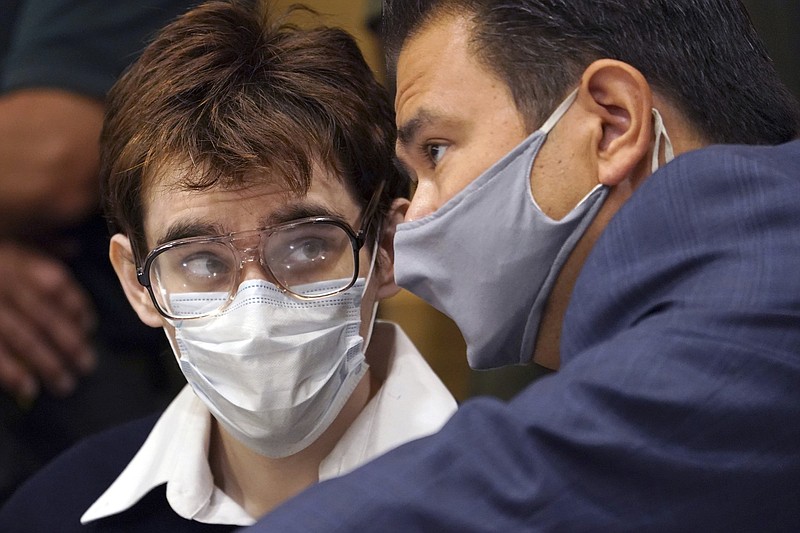FORT LAUDERDALE, Fla. -- The man accused of killing 14 students and three staff members at a Parkland, Fla., high school will plead guilty to their murders, his attorneys said Friday, bringing some closure to a South Florida community more than three years after an attack that sparked a nationwide movement for gun control.
The guilty plea would set up a penalty phase where Nikolas Cruz, 23, would be fighting against the death penalty and hoping for life without parole.
Cruz attorney David Wheeler told Circuit Judge Elizabeth Scherer that he will plead guilty Wednesday to 17 counts of first-degree murder in the February 2018 shooting at Marjory Stoneman Douglas High School. The pleas will come with no conditions and prosecutors still plan to seek the death penalty. That will be decided by a jury, with the judge hoping to start the trial in January after choosing a jury from thousands of prospects starting in November.
Cruz will also plead guilty to 17 counts of attempted first-degree murder. He was not initially present during the hearing, but later entered the Broward County courtroom to plead guilty to attacking a jail guard nine months after the shooting.
Cruz said he understood that prosecutors can use the conviction as an aggravating factor when they later argue for his execution.
[Video not showing up above? Click here to watch » arkansasonline.com/1016parkland/]
The trial has been delayed by the pandemic and arguments over what evidence could be presented to the jury, frustrating some victims' families and the wounded.
Samantha Grady, who was injured in the shooting and lost her best friend, 17-year-old Helena Ramsay, said she is glad Cruz is finally acknowledging the damage he caused.
"I hope we can start the process of truly moving on," she said. "His punishment should be equal to the lives he has taken, the stress and horrors he has caused in a whole community, a whole state."
Mitch and Annika Dworet, the only victims' parents to attend the hearing, said they are relieved the case is finally moving toward closure. Their 17-year-old son Nick died in the shooting and his younger brother Alex was wounded.
Mitch Dworet said he tries hard not to think about the case, saying he wants to focus on their sons. But his wife interjected, "We want justice -- it's time." For them, that means Cruz's execution.
"We would like to see him suffer," Mitch Dworet said.
Andrew Pollack, whose 18-year-old daughter Meadow was killed, said in a phone interview that he also wants Cruz executed. "Death by lethal injection seems too peaceful to me. I'd rather see a hanging in a public square."
In the aftermath of the shooting, Parkland student activists formed March for Our Lives, a group that rallied hundreds of thousands around the country for tighter gun laws, including a nationally televised march in Washington, D.C.
The decision by Cruz to plead guilty came unexpectedly. He had been set to go on trial next week for the attack on the Broward County jail guard.
Cruz and his lawyers had long offered to plead guilty to the shooting in exchange for a life sentence, but prosecutors had rejected that deal.
Attorney David Weinstein, a former Florida prosecutor who is not involved in the case, said that by pleading guilty to the murder charges, Cruz's lawyers will be able to tell the jury in the penalty hearing that he "has accepted responsibility, has shown remorse and saved the victim's families the additional trauma of a guilt-phase trial."
The jurors also won't repeatedly see the security videos that reportedly captured the shooting in graphic detail. Their goal will be to persuade one juror to vote for a life sentence, as unanimity will be required to sentence Cruz to death.
Distrurbances had frequently brought Broward sheriff's deputies to the Cruz home in an upscale neighborhood where he lived with his widowed mother and younger brother, but they said nothing was ever reported that could have led to his arrest.
Cruz alternated between traditional schools and those for troubled students.
He attended Stoneman Douglas starting in 10th grade, but his troubles persisted. At one point, he was prohibited from carrying a backpack to make sure he didn't have a weapon. Still, he was allowed to participate on the school's rifle team.
He was expelled about a year before the attack after numerous incidents of unusual behavior and at least one fight. He then began posting videos online in which he threatened to commit violence, including at the school.
Someone worried about his emotional state called the FBI a month before the shooting to warn agents that he might kill people. The information was never forwarded to the agency's South Florida office.
Another acquaintance called the Broward sheriff's office with a similar warning, but when the deputy learned Cruz was then living with a family friend in neighboring Palm Beach County, he told the caller to contact that sheriff's office.
Information for this article was contributed by Freida Frisaro, Adriana Gomez Licon and Curt Anderson of The Associated Press.

